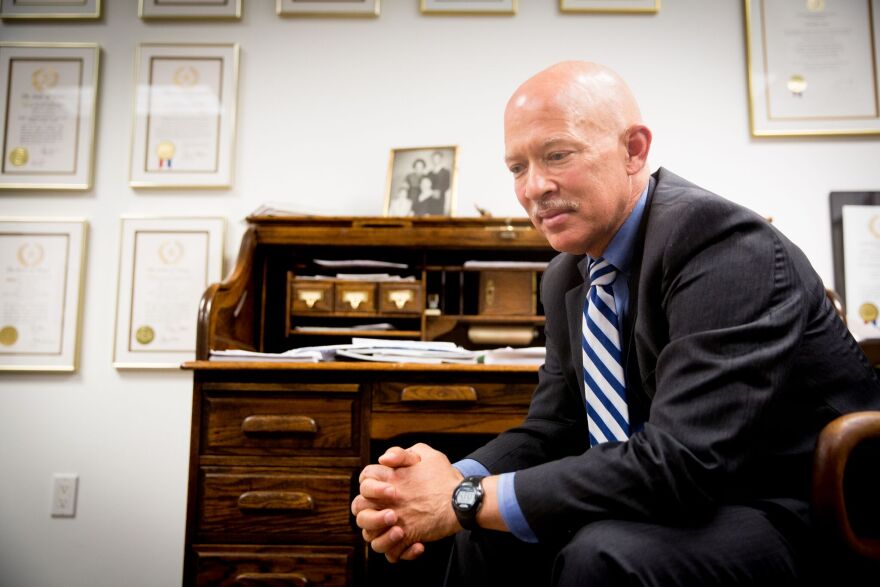When John Creuzot takes office in January as Dallas County district attorney, he promises to usher in a new era of prosecution.
"It's time for real criminal justice reform in Dallas County and we're going to deliver," he proclaimed to an enthusiastic crowd of Dallas County Democrats gathered on election night to watch the results roll in. Creuzot won 60 percent of the vote, defeating Republican incumbent Faith Johnson.
Standing on the stage at the Hilton Regency ballroom, Creuzot laid out an expansive agenda, pledging to decline prosecution for first-time marijuana possession, to pursue drug treatment for drug offenders instead of sending them to prison, and to refuse to revoke probation for technical violations. He also pledged to bulk up a conviction integrity unit to make sure wrongfully convicted people don't stay in prison, and to fight for bail reform.
"How about an end to the excuses?" he bellowed to cheering supporters. "How about making sure that if you're poor you don't get ripped off by the criminal justice system?"
This kind of speechifying doesn't always seem to come naturally to Creuzot, a criminal justice wonk who says his policy reforms will be based in rigorous data gathering and a careful study of best practices.

More typically, Creuzot delivers withering analyses of the criminal justice system's flaws and excesses in a straight-forward way. It takes a moment to sink in that, this time, he sounds more like an activist than someone who'll be the top law enforcement officer of Texas' second-largest county.
"Well, I mean, historically, if you're poor you're more likely to go to the penitentiary," he says simply, adding that little has changed.
Poor people and people of color are more likely to be arrested, to get charged more severely, get offered less-lenient plea deals and get longer jail and prison sentences; just look at the data, he says.
Creuzot, a one-time prosecutor and current-day defense attorney, made a name for himself as a judge by launching the county's first drug court back in 1998, offering drug abusers addiction treatment in lieu of incarceration. It was effective, he'll tell you: a 68 percent reduction in re-arrests and $9.43 in criminal justice cost savings for every dollar spent on the drug court.
Today, resources in the district attorney's office are often spent on small-time and non-violent offenses tied to larger issues like poverty, addiction and mental illness — resources, Creuzot says, that should be freed up to focus on prosecuting violent, hardened criminals.
Henry Wade: A reputation for strong prosecution
For decades, district attorneys across the country were judged for how tough they were on crime. And no one was tougher than Henry Wade, the legendary Dallas County DA from 1951 to 1987. The cigar-chomping embodiment of Texas justice was the Wade in Roe v. Wade. He prosecuted Jack Ruby for killing the man who assassinated President John Kennedy.
For 36 years, Wade oversaw an office that piled up conviction after conviction on high-profile cases and against low-level offenders.
"I hope I have a reputation for strong prosecution," Wade told KERA in 1986. "I'm trying to build one."
In the years since, that reputation for strong prosecution came to be seen as a win-at-all-costs approach that prized conviction over justice.
In 2007, Craig Watkins drew national attention as the first black district attorney in Texas, and for setting up a conviction integrity unit in Dallas that exonerated innocent people who'd been wrongfully convicted, many by Henry Wade's prosecution machine.
"We threw this whole idea of dispensing justice out the window. We didn't care if a person was innocent or a person was guilty," Watkins said in a speech in 2008. "We just cared that we could wave that banner to the person who was voting and say that we got a conviction, and our conviction rate was high."
These days, criminal justice reform has become a cause that spans the political spectrum. States have embraced it as prison populations have ballooned despite historically low crime rates. Texas has led the way on a host of reforms, many of which are replicated in a federal reform bill that President Donald Trump has praised and Sen. John Cornyn of Texas co-sponsored.

In the Dallas district attorney's office, Watkins was followed in the office by Susan Hawk, a Republican who launched a program to divert people with mental illness and young, first-time offenders away from prison.
Faith Johnson was appointed to the office when Hawk stepped down in 2016, and she held events to help people expunge old arrest records and won acclaim for successfully prosecuting the white Balch Springs police officer who shot and killed a black teenager, Jordan Edwards.
Continue reading
» This story is part of our One Crisis Away project's The Price of Prison series. Visit our projects site to read more and view digital extras.













